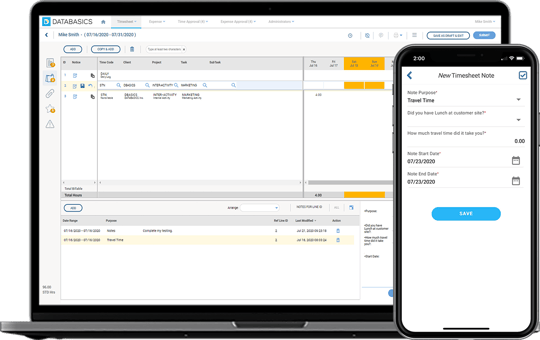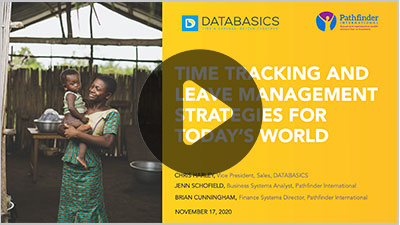
When it Comes to Approvals, More is Definitely Less
As providers of time tracking and expense reporting software for businesses, we at DATABASICS understand the importance of reviewing employee reports.
After all, these reports drive payroll and billing as well as project, workforce and financial management – even strategy. It’s important that they be complete, accurate and compliant. To ensure quality, you need to invest in your approval process. Investment in approvals typically means some sort of automation, but also creating multi-layered, complex approval chains. The first is absolutely necessary. The second, counter-intuitively, is a really bad idea.
Here’s why: as you add approvers, something called the “Bystander Effect” kicks in, along with an associated “Diffusion of Responsibility.” Simply put, the ball gets dropped. According to the “Bystander Effect,” as the size of a group grows, the likelihood that an individual will speak out about a problem or take action declines.
This phenomenon gained particular prominence with the murder of Kitty Genovese in 1964 on a New York City street. Scores of people in surrounding buildings heard her screams, but nobody came to her rescue because “nobody wanted to get involved.” Psychologists discovered that there was more to it than that. It wasn’t indifference that inhibited their response. It was the fact that they knew other people could hear her, so they were effectively “bystanders.”
Related Article: Under-Managing Leave Isn’t Good for the Employer or Employees
Psychologists also found that “redundancy of information” can have a compounding effect on being a bystander. If you assume everyone else knows what you know, you either conclude that someone has already done or will do something. Example: recently, the power went off in my neighborhood. I didn’t bother to call it in to the utility company because I figured my neighbors would be all over it. Of course they were, and my inaction was reinforced.
Getting back to business. In the typical approval chain, approvers look for something to jump out at them. No specific check is their responsibility alone, except perhaps matching purchase receipts to line items. No one is any more accountable than anyone else. No surprise, then, that it’s a field day for the “Bystander Effect” and “Diffusion of Responsibility.” Everyone relies on everyone else for reviewing reports with the intended seriousness. As a result, the process actually is less effective than if reports were the responsibility of single individuals.

Still, a reliable approval process depends on more than eliminating overlapping activity. Additionally, you need:
- Clear, specific directions about what to look for. Relying on “things jumping out at you” is no process at all. If the organization has trouble formulating directions, it’s far worse for an approver who probably views the task as among the least favorite things he is called upon to do.
- Reasonable accommodation for the time a thorough review will take. When a person is assigned approval responsibilities, that person should have the wherewithal to do the job properly. That means the person should not be so loaded with other tasks that approvals end up compromised.
- Assignment of responsibility to approvers who are not subject to reprisal by the submitter. This is especially challenging when executive expenses have to be approved. Another example is when a “super star,” who no one wants to irritate, is discovered to have reporting problems.
- A feedback loop for approvers so they can learn to be increasingly efficient. The feedback loop is also critical to refining directions.
- Automation. Automate as much as you can. Doing approvals right is tedious and time consuming. A system that can “flag” reports based on business rules can be invaluable, taking hours of work off the plate of an approver.
Remember, with approvals, more is definitely less. Approvals are an essential internal control. Make sure your process can handle the job.
Get more insights on leave management in our 2021 webinar, Time Tracking and Leave Management Strategies for Today's World:
For more information on the DATABASICS Time & Expense solutions, contact us, or call (800) 599-0434.
DATABASICS provides cloud-based, next generation Expense Reporting, P-Card Management, Timesheet Management, Leave Management, and Invoice Processing automation. Specializing in meeting the most rigorous requirements, DATABASICS offers the highest level of service to its customers around the world.
DATABASICS is relied upon by leading organizations representing all the major sectors of the global economy: financial services, healthcare, manufacturing, research, retail, engineering, nonprofits/NGOs, technology, federal contractors, and other sectors.
Connect with DATABASICS: LinkedIn, Twitter, and YouTube. DATABASICS is headquartered in Reston, VA.
Subscribe to our blog
Recent Posts
Posts by Topics
- Expense Management Software (130)
- DATABASICS (69)
- Time Tracking Software (47)
- Leave Management System (26)
- P-Cards (9)
- Home Healthcare (8)
- Government Contractors (7)
- Nonprofit Organizations (7)
- International Development (6)
- Receipt Management (6)
- Advanced OCR (2)
- CROs (2)
- Staffing Agencies (2)
- Vendor Invoice Management (2)
- Audit Management Software (1)
- Construction (1)
- Field Service Management (1)
- Integration (1)
- Microsoft Dynamics (1)
- Oracle NetSuite (1)
- Partnerships (1)
- Professional Services (1)
Read on

Expense Fraud Isn’t New Because of AI; It’s a Systems & Operational Problem
Read Now
Enhancing Employee Experience with Mobile Expense Management
Read Now
Maintaining Compliance with Mobile Expense Management Tools
Read NowSeamless Integration of Time Tracking and Payroll
Read Now
Seamless Migration from Nexonia: Unified Time and Expense Solutions
Read Now
Nexonia Migration: The Best Alternative for Timesheets & Expense Management
Read Now
Subscribe to Our Blog
Subscribe to our blog and get the latest in time tracking and expense reporting news and updates.
